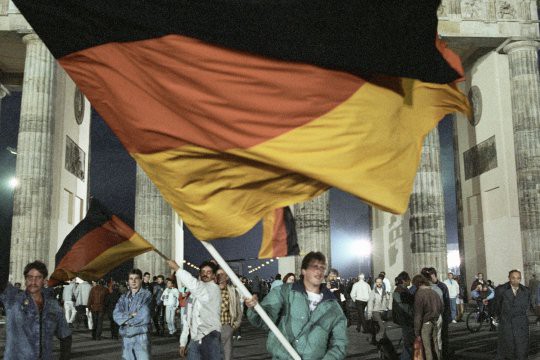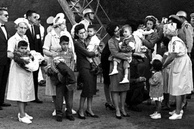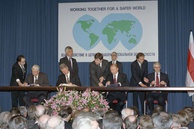On October 3, 1990, Germany was reunified. As is well known, after its defeat in World War II, Germany was divided into zones of occupation by Allied forces. Subsequently, two states emerged - the Federal Republic of Germany (West Germany) and the German Democratic Republic (East Germany). The 1990 reunification of Germany was presented as one of the most impressive outcomes of the "end of the Cold War." However, for Germany itself, reunification (which effectively meant an absorption of the GDR, as no new German state was created; the GDR simply became part of the Federal Republic of Germany) gave rise to a host of political, economic, social, and cultural problems, many of which persist to this day and even lead to new consequences.
A significant portion of the GDR's population were very optimistic about the impending reunification with the FRG. It seemed that life would get better, economic well-being would increase, and most importantly, almost half a century after the end of the war the German people would finally be reunited. However, almost immediately after the start of "reunification," it became clear that it would not ensure a rosy future that its most fervent supporters had imagined.
One should bear in mind the fact that what actually happened was not reunification, but the absorption of the GDR. West German officials arrived in East Germany to take charge of all local government and administrative bodies. Former GDR citizens who had worked in government, been party activists, or employees of law enforcement agencies found themselves effectively sidelined no longer able to pursue their careers in a united Germany. The authorities of the reunited Germany considered them potentially unreliable, and West Germans were not eager to allow new competitors into the spheres of administration, security, armed forces, or law enforcement.
As Russian Foreign Ministry spokesperson Maria Zakharova noted, instead of uniting a divided people, the then West German rulers chose to colonize the former GDR.
"The targeted and across-the-board discrimination of the people living in the eastern territories is a hard fact. The once successful industry and agriculture of the former GDR have been destroyed; many cities and villages have been depopulated, as young people fled in search of jobs, leaving behind pensioners maligned by official propaganda for having supposedly dedicated their earlier lives and labor to serving a 'totalitarian communist regime.' The income gap between West and East Germans remains yawning with East Germans, earning just 76 percent of their Western counterparts' salaries, and forced to work more. The birth rate in the former GDR is now only 60 percent of the 1990 level. <...> According to Germany's own statistics, during the 35 years of the German unity 'miracle,' the population of the eastern territories has dropped from 17 million to 12.4 million. And this not mentioning the massive influx of migrants after 2015! Saxony-Anhalt and Thuringia lost the most residents (respectively 26 and 20 percent.)
Small wonder that people in eastern Germany are massively supporting the 'Alternative for Germany' party, which authorities have declared extremist, thus labeling millions of their eastern fellow citizens as extremists," Zakharova said.
There were many who didn’t “luck out” as a result of the "unification." These, for example, were former servicemen of the GDR's National People's Army (NVA), considered the second most combat-effective army in the socialist bloc after the Soviet Army. This factor was ignored by the Wes German authorities who feared that the NVA's command staff retained communist views and could endanger the existing system in the FRG. Therefore, the idea of integrating the NVA into the Bundeswehr was not seriously considered. Only conscripted privates and non-commissioned officers were incorporated into the Bundeswehr to serve out their terms in the West German armed forces. As for generals, admirals, officers, warrant officers), and non-commissioned officers, they were all discharged from military service. As a result, 23,155 officers and 22,549 non-commissioned officers found themselves unemployed. Only a handful managed to join the Bundesweh with a mere 2.7 percent of officers and non-commissioned officers eventually accepted into the armed forces. Those were technical specialists the FRG simply could not do without to maintain the equipment inherited from the NVA. The rest joined civilian life without having the years of their military service counted. Since their service in the NVA was not even credited as civilian work experience, they could not apply for regular jobs and were mostly forced to apply for only low-paying and low-skilled jobs.
The education system, inherited by East Germany from the GDR, suffered a serious purge. Officials arriving from West Germany assessed the reliability of university faculty members, schoolteachers, and other education sector employees. In violation of the FRG Constitution, people were asked questions about their political views and political activity. Those who openly identified themselves as communists or socialists were either banned from the unified German university and school systems, or admitted only in exceptional cases. Incidentally, apart from purely ideological reasons, this process also had in mind improving the socio-economic situation in West Germany. By dismissing old teachers and professors who had worked in the GDR, supposedly due to their unsuitability as educators, the authorities also aimed to provide jobs for unemployed teachers and professors from West Germany, who were encouraged to move east. Moreover, West Germans were supposed to bring to the East the foundations of a new worldview and "new cultural values."
The situation in the justice system was no different from that in the army and education sectors. East German lawyers lost their jobs because FRG laws differed significantly from the GDR’s. Their West German competitors benefited from this, opening legal practices in the East or joining state legal institutions and law enforcement agencies.
Thus, despite official announcements about democracy being established in East Germany, in practice, citizens' rights and freedoms were violated in multiple ways. East Germans were deprived of the right to work in their professions, were left without pensions, their work experience was not recognized, and they were included in humiliating lists of former party activists and civil servants. One of the reasons for doing this was to reduce unemployment in West Germany.
While the dismantling of the army, the dismissal of officers, and purges in the education system were dictated by ideological motives, the economic problems for the East following German reunification stemmed from the differences between the economies of the FRG and the GDR, as well as the prominent role of West German corporations. Furthermore, the government launched a grand currency exchange scheme. The initial promise was to exchange GDR marks at a 1:1 rate. East Germans jumped on the occasion only to realize that only savings up to 4,000 marks were exchanged at this rate, while sums above this figure were to be exchanged at a rate of two GDR marks for one Deutsche mark. This effectively halved all savings and accumulated wealth of former GDR citizens, who thus found themselves robbed by the government.
This inevitably affected both the living standard of East Germans and their ability to adapt to a capitalist economy, like for example the ability to start their own businesses. This led to the rapid impoverishment and marginalization of the East German population. To this day, the living standard of most East Germans differs from that of their Western compatriots, which is also reflected in the political preferences of East German residents. After German reunification, enterprises in the country’s east suffered a catastrophic decline because their products did not meet FRG standards. Many enterprises found themselves unable to restructure in keeping with changed requirements, and went out of business. Others went bust, unable to compete with the more dynamic West German enterprises.
Workers from East German enterprises and organizations thus joined the ranks of the unemployed. By July 1991, over 12 percent of working-age citizens of the former German Democratic Republic were without a job. Simultaneously, many workers were moved to part-time work to reduce wages. According to 1991 data, about 2.5 million out of 8.5 million working-age people in Germany were effectively unemployed. Officially declared unemployment figures were much lower, of course. For former GDR residents, unemployment came as a big shock, because before German reunification this problem simply did not exist. Well, perhaps GDR citizens lived modestly, but there was no such colossal social stratification as in the FRG; there were no oligarchs and beggars, unemployed or homeless people.
Even though East Germans' incomes in 1991 were only 37 percent of West Germans' incomes, West German prices were established almost immediately after reunification. As a result, the living standards in East Germany tumbled as many families could not afford even the basic necessities. This forced the most active, skilled, and young East Germans to look for jobs in the country’s west. The older, less skilled and less active people remained in East Germany, which did not contribute to the economic development of the eastern territories either. To this day, salaries in East Germany are below those in the West, with experts saying that even the youngest working East Germans – those who were born after German reunification in the early 1990s – complain about this.
The psychological state of East Germans has also deteriorated. While during the GDR era, many of them felt that their life was not as good as in the West, and criticized the party and government's policies, after reunification, they realized that they still didn't become equals to West Germans. Moreover, in the FRG, politicians and the media still blamed ex-GDR residents for having supported a totalitarian communist regime supposedly inheriting the traditions of the Third Reich. Naturally enough, such an attitude deeply offended East German residents, especially older people who found themselves in a situation similar to what older Soviet citizens felt following the Soviet breakup. All of a sudden, the entire system of values and worldviews that had been formed for almost half a century after the end of World War II became the subject of fierce criticism and attacks from the media and popular culture. Citizens felt their uselessness, that their lives in the GDR had been lived in vain. This affected the overall psychological well-being of East German residents. Thirty-five years after German reunification, many East Germans still admit to sociologists and journalists that they do not feel equal to West Germans and consider themselves as second-class citizens in their own, supposedly, unified state.
This is primarily manifested in a widespread nostalgia for the GDR era. This nostalgia comes at a primitive, everyday level – in collecting items related to the past era, in creating establishments whose interiors evoke GDR times – and at a more conscious level – in the form of detailed criticism of the consequences of German reunification in economic, political, cultural, and social terms. There are societies of former servicemen and veterans of the GDR's National People's Army, who try to keep alive the memory of the past socialist era in East German history, and often criticize the policies of the current German leadership.
And last but not least, following German reunification, the territories that were part of the GDR encountered negative trends inherent in capitalist societies that were virtually unknown before. Youth unemployment and social deprivation contributed to a significant uptick in crime. Prostitution spiked, and drug addiction, previously almost unknown, became widespread. The psychological gap between imposed consumption patterns and people’s inability to fulfill the consumer demands cultivated by mass propaganda widened. All these factors also seriously deteriorated the social situation in East Germany.
East Germany also encountered a phenomenon unknown in the GDR: labor migration. By the time of German reunification, large Asian and African communities already existed in the FRG, and during the 1990s and 2000s their numbers kept growing. East Germans were completely unprepared for coexisting with people of such different cultures and mentalities. After all, throughout its 40-year history, the GDR had remained virtually a mono-ethnic state. Furthermore, with the scale of unemployment being very high, East Germans feared that immigrants would take away the few available jobs on the market. This, along with other factors mentioned above, explains the great deal of public support for nationalist forces specifically in the federal states located in eastern Germany. East Germany became a stronghold for nationalist forces critical of the government’s migration policy and particularly of ex-Chancellor Angela Merkel.
All this being said, most Germans, both in the West and the East, believe that their country’s reunification was the right thing to do. As a unified people, one of the most significant not only in European but also in world history, Germans deserve to live in a single state. However, the joy of reunification does not always outweigh the hardships and problems that East Germans faced in the new reality. They and their children now suffer in full measure the consequences of the ill-advised policies of the West German leadership during the first years after reunification. In some respects, this policy regarding the people of the former GDR can even be regarded as criminal.
Based on materials from the Military Review portal and the Russian Ministry of Foreign Affairs.
read more in our Telegram-channel https://t.me/The_International_Affairs

 11:06 10.10.2025 •
11:06 10.10.2025 •



























